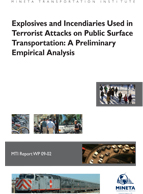- 408-924-7560
- mineta-institute@sjsu.edu
- Donate
Explosives and Incendiaries Used in Terrorist Attacks on Public Surface Transportation: A Preliminary Empirical Analysis
This report provides data on terrorist attacks against public surface transportation targets and serious crimes committed against such targets throughout the world. The data are drawn from the MTI database of attacks on public surface transportation, which is expanded and updated as information becomes available. This analysis is based on the database as of February 20, 2010. Data include the frequency and lethality with which trains, buses, and road and highway targets are attacked; the relationship between fatalities and attacks against those targets; and the relationship between injuries and attacks against them. The report presents some preliminary observations drawn from the data that can help stakeholder governments, transit managers, and employee to focus on the ways the most frequent and/or most lethal attacks are carried out as they consider measures to prevent or mitigate attacks that may be considered likely to happen in the United States.
BRIAN MICHAEL JENKINS
Brian Michael Jenkins is one of the world’s foremost authorities on terrorism and sophisticated crime. From 1989 to 1998, Mr. Jenkins was the Deputy Chairman of Kroll Associates, an international investigative and consulting firm. Before that, he was chairman of RAND’s political science department, where from 1972 to 1989, he also directed RAND’s research on political violence. He is currently a senior advisor to the president of RAND.
Mr. Jenkins has a bachelor of arts degree in fine arts and a master’s degree in history, both from UCLA. He studied at the University of Guanajuato in Mexico and in the Department of Humanities at the University of San Carlos in Guatemala, where he was a Fulbright Fellow and recipient of a second fellowship from the Organization of American States.
Commissioned in the infantry at the age of 19, Mr. Jenkins became a paratrooper and ultimately, a captain in the Green Berets. He is a decorated combat veteran, having served in the Seventh Special Forces Group in the Dominican Republic during the American intervention and later as a member of the Fifth Special Forces Group in Vietnam (1966—1967). He returned to Vietnam on a special assignment in 1968 to serve as a civilian member of the Long Range Planning Task Group; he remained with the group until the end of 1969, receiving the Department of the Army’s highest award for his service. Mr. Jenkins returned to Vietnam in 1971 on a special assignment.
Mr. Jenkins is the author of International Terrorism: A New Mode of Conflict, the editor and coauthor of Terrorism and Personal Protection, co-editor and co-author of Aviation Terrorism and Security, and co-author of The Fall of South Vietnam. He is also the author of numerous articles, book chapters, and published research reports on conflict and crime.
In 1996, President Bill Clinton appointed Mr. Jenkins to be a member of the White House Commission on Aviation Safety and Security. From 1999 to 2000, he served as an advisor to the National Commission on Terrorism and in 2000 was appointed to be a member of the U.S. Comptroller General’s International Chamber of Commerce (ICC) and a member of the board of directors of the ICC’s Commercial Crime Services. Mr. Jenkins was also a member of the Transportation Research Board/National Research Council Panel on Transportation: Science and Technology for Countering Terrorism in 2002.
Mr. Jenkins has led the Mineta Transportation Institute’s counterterrorism research team since 1997, producing three volumes of case studies of major terrorist attacks on surface transportation.
BRUCE R. BUTTERWORTH
Bruce Butterworth has had a distinguished government career in the Congress and the Executive Branch. Between 1975 and 1980, as a professional staff member for the House Government Operations Committee, he ran investigations and hearings on many transportation safety issues, particularly in aviation. He spent 11 years in the Department of Transportation, eight of them in the Office of the Secretary of Transportation. He managed negotiations on the inclusion of air and maritime services in the General Agreement on Tariffs and Trade (GATT—now the World Trade Organization[WTO]), chaired U.S. delegations to United Nations Committees, dealt with transport and aviation issues related to border inspections, and was part of the response to the attack on Pan Am 103.
Mr. Butterworth has held two executive posts in aviation security. As Director of Policy and Planning (l991—1995), he established strategic, long-term, and contingency plans and federal rules. As Director of Operations (1995—2000), he was responsible for federal air marshals, hijacking response, and 900 field agents; he worked hard to improve security and the performance of security measures by U.S. airports here and by U.S. airlines worldwide. He ran the FAA’s aviation command center, successfully managing the resolution of hijackings and security emergencies. He launched a successful program of dangerous-goods regulation and cargo security after the 1995 ValuJet crash, oversaw the conversion of the air marshal program to a full-time program with high standards, was a key player in the response to the ValuJet and TWA 800 accidents, and was a frequent media spokesperson. He worked closely with the Congress, the National Security Council staff, the intelligence community, law enforcement agencies, and authorities of other nations.
Between September 2001 and January 2003, he was an associate director at the United States Holocaust Memorial Museum and was responsible for security there.
Mr. Butterworth received a master of science degree from the London School of Economics in 1974 and a bachelor of arts degree from the University of the Pacific in 1972 (Magna cum Laude). He was a California State Scholar and a Rotary Foundation Fellow. He has received numerous special achievement and performance awards.
-
Contact Us
San José State University One Washington Square, San Jose, CA 95192 Phone: 408-924-7560 Email: mineta-institute@sjsu.edu






